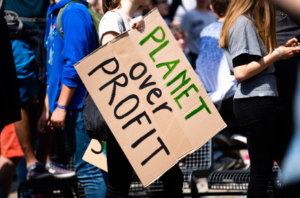Gender equality today for a sustainable tomorrow

This year, the United Nations has chosen the theme of ’gender equality today for a sustainable tomorrow’. This theme encourages us to discuss what gender equality and sustainability have in common, and what we can do to address both of these issues.
To start with, we know that climate change is a severe and prescient issue. Research done by the Climate Change Council of Australia tells us that the global average temperature rise will exceed 1.5 degrees in the next 10 years, and that this could lead to major destruction of natural environments. This risk is already visible, through natural disasters including fires and floods. According to the Reserve Bank of Australia, 3.5 % of houses in this country already fall under the international definition of being high risk to climate change inflicted damage.
However, when we look at an issue such as climate change, we can also see that not all people are impacted in the same way. At its core, climate change is an issue that disproportionally impacts women. This is due to the fact that the majority of people currently living in poverty are women- As discussed by the United Nations ‘Women in the shadow of climate change ‘report, seventy per cent of the 1.3 billion people living in conditions of poverty are women. The vulnerability to climate change is amplified by the fact that women are more likely to live in areas that are reliant on natural resources for their livelihood, and less likely to be in positions of decision making and power.
All these statistics tell us that climate change is impacting people right now. Each person has a responsibility for individually and as a collective to find a way in which to reduce our negative impact on the planet. This is where we look at how the work we do in our organisation, contributes to the broader conversation.
Fitted for Work incorporates these two missions of achieving gender equality while also working towards a sustainable future by remaining conscious of our environmental impact in all aspects of our organisation. Particularly, we acknowledge that we are in a climate crisis and it is something that needs to be reacted to immediately. A tangible way that we are doing this, is through acknowledging the impact on clothes production on the environment. Statistics from Clean Up Australia say that every 10 minutes, Australians dump 15 tonnes of clothing waste, this adds up to 800,000 tonnes, or 31 kilograms per person, every year. To combat this, Fitted for Work and the Conscious Closet encourages recycling clothes to give them a second life, and furthering that by trying to buy our own clothes second hand rather than new as well. A partnership with local charity Reground, has also seen 92.5 KGs of soft plastics diverted from landfill and into recycling programs in the last year, representing a commitment to diverting waste whenever possible.
Ultimately, equal access to resources and opportunity will only further increase the chance for women specially to understand the impact they have on the planet, and the capacity they have to create a sustainable future. Focusing on what we can change, like our consumption of fast fashion only serves to open us up to all the even bigger changes we can make.
Author Jess Naylor 7/03/2022
Image by Markus Spiske


